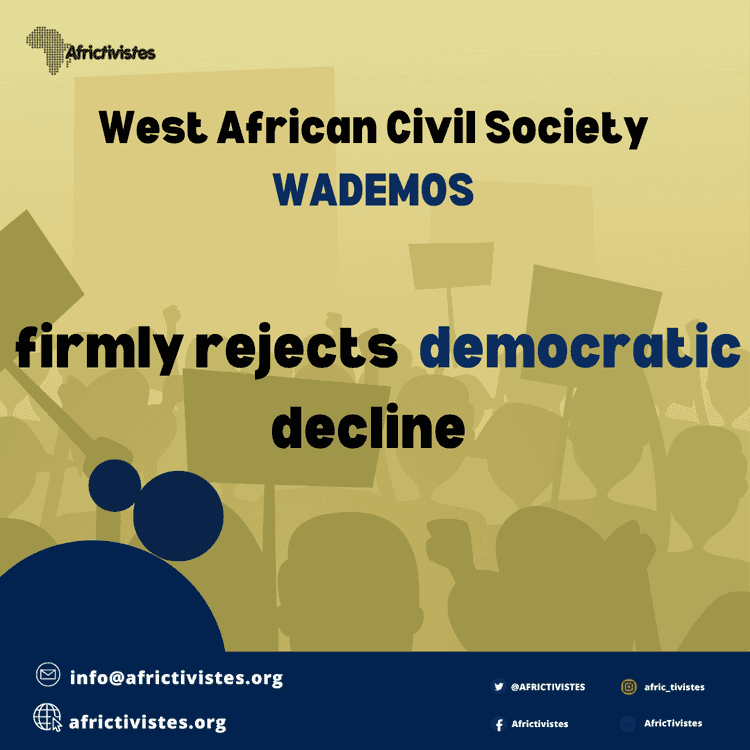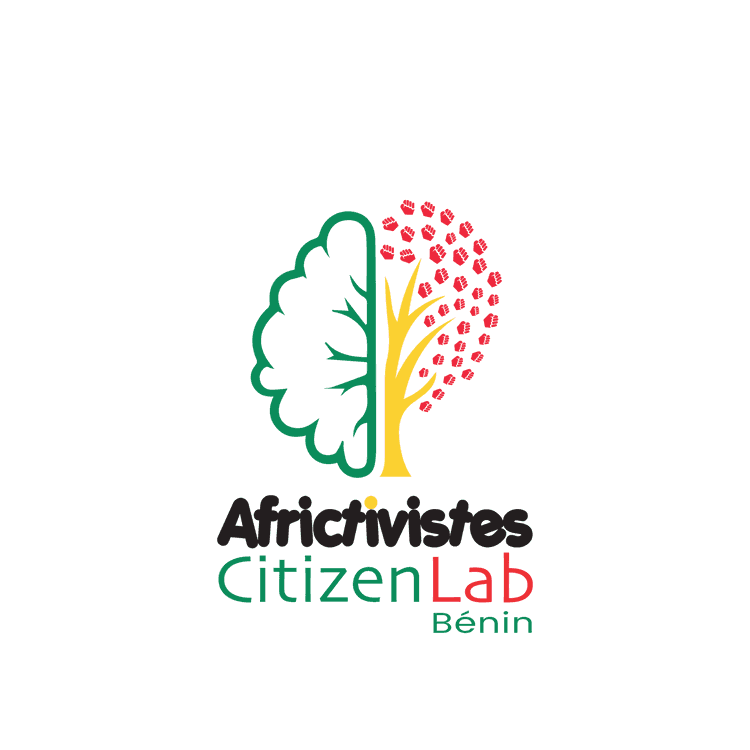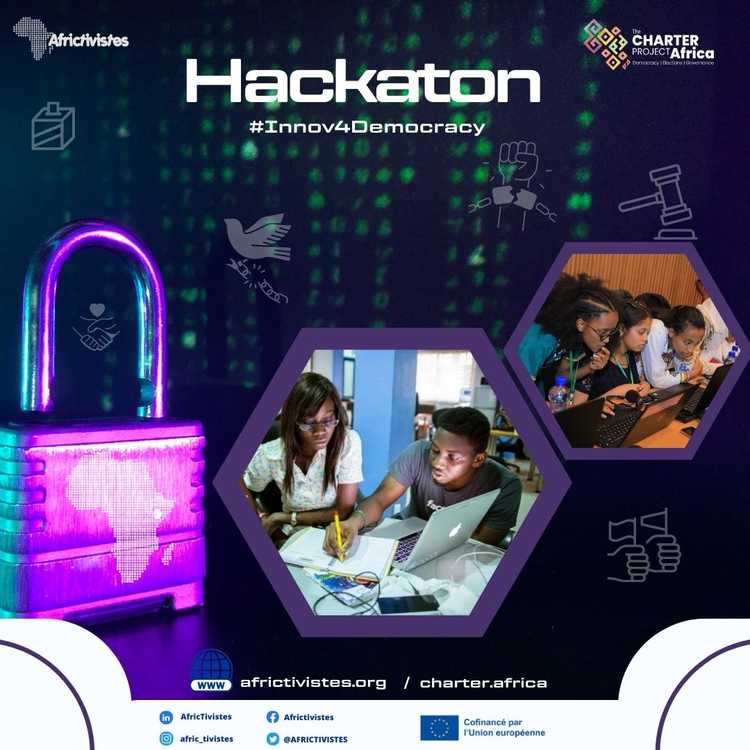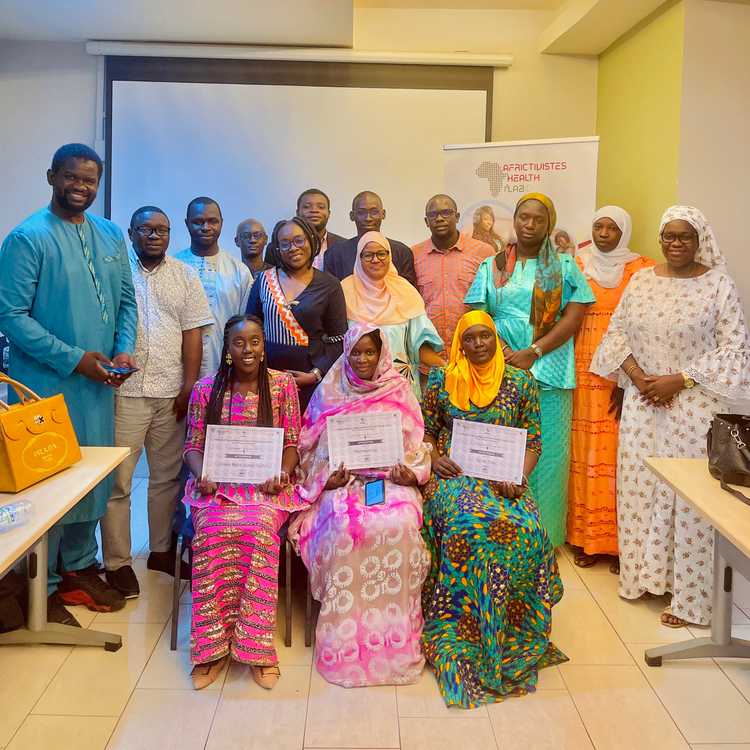West Africa civil society’s solutions to reverse democratic backsliding in French-speaking countries
Lately, anti-democratic overthrows and untimely coups d’état have become commonplace in Africa, particularly in French-speaking West Africa. The West African Democracy Solidarity Network (WADEMOS) organised a regional multi-stakeholder conference in Abidjan, Côte d’Ivoire, from August 1 to 2, 2023, to discuss democratic decline and political transitions in French-speaking West Africa. The discussions, also attended by AfricTivistes President,Cheikh Fall, resulted in a number of recommendations for promoting and safeguarding democratic gains, for the benefit of the Economic Community of West African States (ECOWAS), civil society and local populations, among other stakeholders.
With the military takeover in Niger, West Africa is the scene of constant undemocratic overthrows including several military coups in the last three years and failed attempts in Guinea Bissau and The Gambia. Mali suffered two coups (2020 and 2021), Guinea one in 2022 and Burkina Faso two in 2022 (January and September). The coups happened in a context of “widespread disregard for political and civil liberties”, coupled with “worsening insecurity and growing economic difficulties”, reads the final declaration of the Wademos regional conference.
Experts in democracy and governance from the West African region and senior officials of the ECOWAS Commission, pro-democracy actors and experts in democracy and governance from the region, as well as ECOWAS officials attended the conference.
Moderating the round table on “The Decline of Democracy in Francophone Africa”, AfricTivistes President Cheikh Fall challenged speakers on the decadence and breakdown of trust in representative democracies, the absence of states and the sense of abandonment that fuels separatist ambitions or security crises, among other current issues.
The speakers were: Ibrahima Kane, legal expert and special advisor to the Open Society Foundation and head of the African Union programme, with in-depth knowledge of socio-political dynamics in Africa. Mathias Hounkpe, expert in the promotion of elections and good governance in the sub-region. Augustin Loada, an academic who has contributed to several research projects on governance, political dynamics and democracy in the region. Aissatou Kanté, researcher at the regional office of the Institute for Security Studies (ISS), currently working on coups d’état. Lassane Ouedraogo, PhD holder in Arts and Media Studies, lecturer and researcher on media literacy, representation and identity, Islam, non-state groups and social change.
The round table was an opportunity for speakers to share their experiences, recommendations and possible solutions.
According to the various players who took part in this multipartite conference, a number of factors need to be taken into account to understand this situation. These factors include “growing dissatisfaction among West African citizens with the processes and outcomes of democratic governance, which are contrary to popular expectations that democracy would promote the economic well-being of ordinary citizens”, they said in the statement.
In addition to these factors, they added “the return of military coups d’état, the manipulation of constitutions and election results to extend mandates, the threat of violent extremism, particularly in the Sahel, and the emergence of external forces and influences that have halted the initial progress noted in democratisation and democratic consolidation in French-speaking West Africa”, warning that this recent “wave” is the “most alarming” of the last decade.
Nevertheless, these experts and actors maintain that at regional level, support for democracy and democratic governance remains “high”. This is despite growing “dissatisfaction” with the state of democratic governance over the past decade, particularly in French-speaking countries. They acknowledged ECOWAS’s “efforts to strengthen resilience in the face of the main threats and reversals encountered within the region”, and efforts to revise the “Regional Protocol on Democracy and Good Governance, in particular by imposing term limits in West Africa and strengthening regional security and stability, including against unconstitutional changes of government in West Africa.”
The WADEMOS network is a non-partisan and independent transnational democratic solidarity network, led by civil society and made up of over thirty-five (35) civil society organisations in 15 West African countries. The objective of the WADEMOS network is to mobilise, coordinate and harness the collective power of civil society and other pro-democracy actors, resources and opportunities within the West African region to advance, defend and reinvigorate democracy and promote democratic norms and reforms in the sub-region.
Abidjan conference recommendations for a return to democratic governance
The conference agreed on a series of recommendations to halt the decline of democratic governance through ” analysis of the triggers” and “strategies for intervention in the current transition processes in Francophone West Africa”.
For a return to democratic governance in French-speaking West African countries, conference participants are calling for, among other things:
– Facilitate an inclusive political dialogue involving all stakeholders, including political parties, civil society, religious groups, women’s groups and marginalised communities.
– Provide support and protection for CSOs working to promote human rights, democracy and good governance. These organisations play an essential role in promoting democratic reform and holding governments to account.
– The need to break free from persistent colonial influence and adopt a more endogenous approach to democracy in West Africa, while promoting civic education for democracy.
– Military juntas must involve civil society, political parties, youth, women and minority communities in the transition process. The inclusion of all voices will strengthen the legitimacy of the decisions taken and create a sense of shared responsibility for the country’s future.
– Civil society must be empowered to engage in ongoing civic democracy education, particularly in the wake of the growing rise in anti-democratic rhetoric across West Africa. We need to launch a vigorous campaign against the current misinformation targeting democracy, and counter the new discourse that pits authoritarianism against democracy.
– CSOs must not focus solely on the transition process and timetable. We need to reorient and broaden our interventions to encompass the entire governance journey. This strategic shift is essential to maintain relevance, particularly in cases where coup plotters move into governance roles.
– CSOs should strive to exert pressure on the African Union (AU) to reduce inconsistencies (overlaps) between the AU and ECOWAS by allowing the principle of subsidiarity to apply in cases of unconstitutional change of power. This implies that ECOWAS, as a regional body with a more direct understanding of the context and challenges in West Africa, should be given more authority and autonomy to deal with cases of unconstitutional changes of government within its member states.
– CSOs should consider forming a strategic alliance with a well-defined and independent intervention plan that will serve as an overarching framework to guide their interventions during transitions.


![[Mali] AfricTivistes calls on the junta to respect fundamental rights!](/static/bd7efaf062b64313cb28d63c1830b96a/9e635/WhatsApp-Image-2024-04-17-at-13.58.19.jpg)


![[Congo]Africtivistes demands the immediate and unconditional release of all activists](/static/503b1823ba8a254ad4ebd649fcf7d38c/fce2a/aliousane.png)

![[Senegal] AfricTivistes and five other organisations demand light be shed on assaullt of journalist Maimouna Ndour Faye](/static/15e44ab239406e91d8f4a5d451f5d71c/9e635/WhatsApp-Image-2024-03-02-at-14.41.24-2.jpg)



![[Senegal] AfricTivistes, two Senegalese journalists petition the ECOWAS Court over repeated mobile Internet data cuts](/static/a46ec338b20b38a189c8e35f96d090a1/fce2a/coupure-dinternet.png.png)
![[Sénégal] AfricTivistes stands against declining democracy in Senegal!](/static/6abab4867f4b682edc9f916ff3bbeb49/9e635/Restriction-internet-.jpg)







